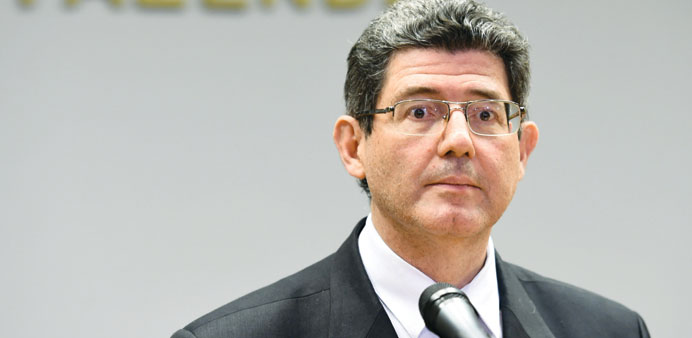Reuters/Lima
Brazilian Finance Minister Joaquim Levy claimed President Dilma Rousseff backed his policies, and he intends to stay on the job as long as needed to put the books in order and pull the economy out of its slump.
Market speculation that Levy, an orthodox economist widely respected among investors, was considering quitting her administration has added fuel to a political and economic crisis that has driven down the Brazilian real currency and pushed up Brazilian interest rate futures.
“She has manifested her support with actions,” Levy said on the sidelines of the International Monetary Fund annual meetings in Peru. “I’m not going to discuss market speculation, but facts. There are no doubts about the need to adjust our finances.”
The University of Chicago-trained economist said Rousseff was committed to pushing through austerity measures opposed by a restive Congress. He said Rousseff was backing his policies and committed to reaching a primary budget surplus of 0.7% of gross domestic product next year.
Rousseff, who was narrowly re-elected in October, picked the banking executive to lead an economic team tasked with undoing a series of policy missteps during her first term that helped plunge the economy into its worst recession in 25 years.
The ideological divide between Rousseff, once a Marxist who believed in armed struggle against capitalism, and Levy, a former IMF official, has sown doubts about their ability to agree on a plan to rescue an economy that not long ago was a Wall Street favourite.
Cheered by markets when he took over as finance minister in January, many investors now believe Levy’s influence in the administration is diminishing and that he has failed to convince Rousseff that Brazil needs to adopt a more aggressive fiscal adjustment plan.
Lawmakers from Rousseff’s own Workers’ Party have criticised Levy and called for his removal.
Levy said he never considered quitting.
“I have no plans of leaving the government,” he said. “We still have a long agenda to fulfill that includes structural reforms and preparing the country to deal with a new international reality.”
Despite growing tensions with Congress that include calls for Rousseff’s impeachment, Levy said he was confident lawmakers would ultimately back a plan to cut spending and raise taxes to return to a fiscal surplus next year.
But Rousseff, whose popularity is the lowest for a president in 30 years, has struggled to keep Congress from approving bills that raise public spending.
The political deadlock led Standard & Poor’s to strip Brazil of its investment-grade rating last month.
The revival of an unpopular financial transaction tax, known as CPMF, is key to efforts to rebalance Brazil’s public accounts and regain the confidence of investors, Levy said.
Business leaders vehemently oppose the CPMF tax proposal, and senior lawmakers say it will be dead on arrival in Congress. They say the government needs to look to other options, like deeper cuts in its spending, to save an additional 30bn reais ($8bn) - about half of the gains planned in Levy’s fiscal package - needed to turn around a gaping deficit.
“This is part of an absolutely standard process of fiscal recovery,” Levy said. “There is no controversy.” He cited an increase in the value-added tax in Britain to plug a widening deficit a few years ago.
Levy said raising other taxes such as duties on industrial products would create bigger distortions in the economy, which already has one of the highest tax burdens in the world.
The administration will constantly review its programmes to reduce spending and improve efficiency, he said. Changes to unemployment insurance payments to jobless fishermen, he added, will save the government up to 1.5bn reais next year.

We still have a long agenda to fulfill that includes structural reforms and preparing the country to deal with a new international reality
